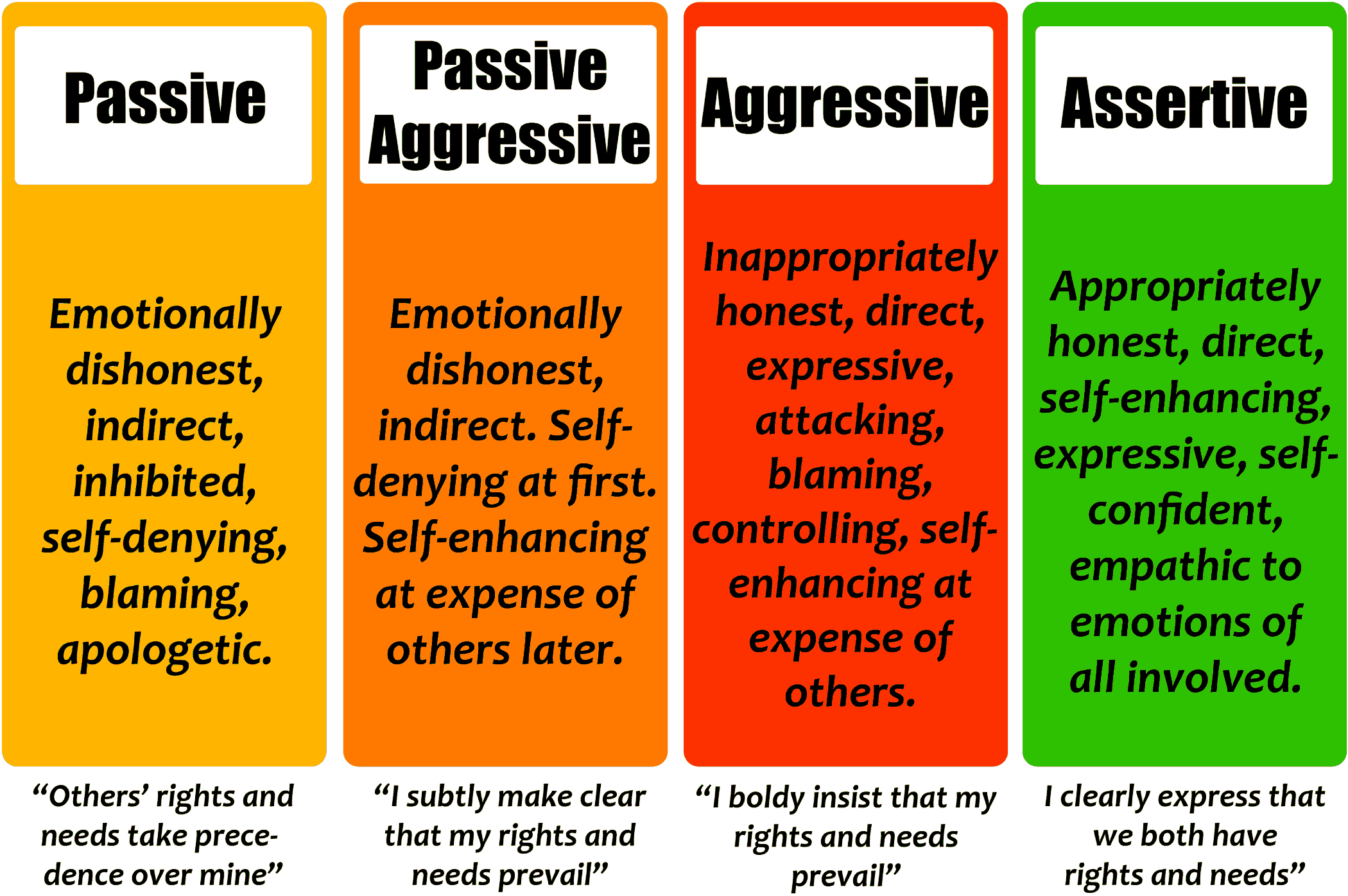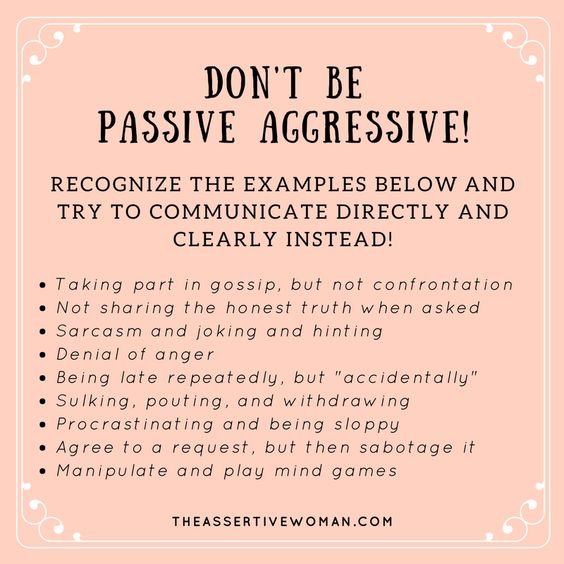Passive Aggressive
is Defensive, Offensive, Oppressive, Intensive and EXPENSIVE!
“Passive Aggression - being covertly spiteful with the intent of inflicting mental pain.”
Passive Aggressive behavior is politely and discreetly conveying 'Fuck You.' Both verbal and non-verbal cues (please read my blog on verbal and non-verbal cues.) Why do so many of us resort to such behaviors? Quite frankly, passive-aggressive acts are:
Defensive - We utter such hurtful comments as a defense mechanism because our minds cannot tolerate acts/comments we do not like. Instantly we are on guard and rebuttal with a passive-aggressive attack as a short-term win. On the contrary, in the long term, we created more damage.
Offensive - Your target will find passive aggression frustrating and offensive, and why should they not. Your aggression isn't a welcoming emotion. Indeed it was your mental goal to inflict pain.
Oppressive - all types of passive-aggressive acts are insidious manipulation and control. Oppressive behavior can take many forms, from hostile remarks made in ignorance to insults, threats, and physical violence or affliction.
Intensive - A passive-aggressive behavior is usually combative with similar nature. On begins an intensive battle, digging deeper and deeper, although futile, all included parties lost their sense of communication over pride and flawed emotions.
Expensive - What is the cost of all this unnecessary and heated back and forth. Stress releases cortisol into your body, devalues yourself and the person you are engaging with, investing precious time into a frivolous situation, wasted efforts to secure a win, and harmful energy that we are putting out attracting more of it. These losses are indeed expensive. Why pay such a high cost through poor communication and pride. You are worth so much more.
Excessive - As soon as you open your mouth to utter a passive-aggressive remark, you've already said too much. Hasn't your mother taught you, "If you have nothing good to say, don't say anything at all?"
Reflexive - We all have natural reflexes; alas, one of them is mental reflexes. We immediately respond to causes, and we create more motivation and affect. None of which are beneficial when referring to passive aggression. Blaming one another is inevitable in this case, and neither is ready to admit or take accountability. Once again, a failed attempt at a win.
Dismissive - This is a tricky one but extremely hurtful. Inhibiting normal behavior is malicious. You ignore, mistreat, disrespect, and dismiss a living and breathing soul in this passive situation. What can be more painful than this? To be unheard or not acknowledged for your feelings (irrelevant to the truth of the emotions, feelings are felt. Ergo, be kind and patient to try harder to understand those you are engaging with even when you disagree.)
Passive Agressive Categories
(Image Copyright- Lucio Buffalmano - Thepowermoves.com)
Successful Communication Guidelines
Use I-Messages.
Avoid the blame game altogether. I-Messages describe the impact of the oppressive behavior on you; they are not intended to attack or blame the other person. Avoid name-calling and put-downs. Stay away from using the term 'YOU.' Bite your tongue if you must but practice using "I" during any discussion in any relationship.
Express your viewpoint as your standpoint or variation without resorting to remarks that accuse the other individual. For example, "You make me tense" is aggressive, while "I feel tense" is assertive.
Focus on your own behaviors.
Evade the urge to fall into riffs by insinuating or implying the other person is rude, cruel, or insensitive. Comment on their behaviors or words without labeling or name-calling them. Words are mighty, so choose your words wisely because you really can't retort them. Words have long caused grudges and inflicted pain for years. Even if you say sorry, some people bear resentment. So it's better to train yourself not to resort to insensitive words or statements. (While I forgave people in my life. The words they uttered will always be just as heartless. Do you want to be an insensitive person? I think not. So try harder. I know you can do it. It just takes practicing patience and self-control. No one enjoys being spoken to with passive aggression. Be nice.)
Keep responses short.
The more you speak, the more likely you will fall into either passive or aggressive practices.
Monitor your tone of voice and non-verbal cues. (Refer to my Blog on Verbal and Non-verbal Cues.)
You can choose just the right words and ravage them with a sharp tone or aggressive posture.
Listen with sincerity.
Hear out the other individual as well. To do this, you need to open up communication. This may involve acknowledging their feelings, asking them to share more, and probing gently. If the person is willing to open up and give you insight into what motivated the behavior, you'll be better positioned to provide a hand and ensure that the behavior doesn't occur again in the future. Give them a chance to speak even if you do not like what they want to say. You demonstrate interest even when it is difficult; they will naturally calm down as they begin to feel heard. All people want is to feel acknowledged. Please pay close attention to what they wish to say as well. If you do not listen, you will become aggressive because you may be contending anxiety that genuinely doesn't exist or has not happened yet. (more on that on my blog F.E.A.R. -False Evidence Appearing Real.)
Be firm in asserting you must treat each other with respect.
You will communicate that you care about them and their feelings by listening actively and using I-Messages. That will increase your chances of opening up communication. But opening up a dialogue and understanding where someone is coming from doesn't mean you accept the behavior.
Don't be paralyzed by fear of making mistakes.
We will inevitably make errors in working on passive aggression issues and strengthening relationships with people who think differently from ourselves. We'll say things that we wish we could retract. But most people are eager to look beyond our mistakes and give us the benefit of the doubt if our interest in them is genuine and our minds and hearts are open to understanding one another.
Maintain eye contact.
Too little eye contact and you could be perceived as deceitful. Too much eye contact, and you could come across as aggressive. Moderately steady eye contact with short breaks every few seconds is presumably appropriate.
Here are some ways you can apply the general guidelines to communicate assertively without slipping too far into either passive or aggressive communication:
"When you (their behavior), I feel/felt (your feeling/interpretation)."
"When you said/did (their words/actions), I understood that to mean (your interpretation)."
"I see/perceive (a behavior, tone, or word choice), to mean (your interpretation)."
*Additional Successful Guidelines*
Technology Passive-Aggression
Here we witness the most typical form of communication in the new world of technology. As if losing eye contact, affection, and face-to-face wasn't enough, text messages have now become the easiest way to be passive-aggressive. One word or short response to a sincere text is indeed cold.
'k' - has its owns memes like 'lmnop.' But on a more serious note, it displays your lack of interest and dismissive behavior toward one that is reaching out. If you are no longer interested in communicating with this person, say it explicitly in its most positive form. However, trying to stay in power, control, authority, manipulate, ignore, or be rude only speaks of your personality, not theirs.
So while you feel 'COOL,' you're the 'FOOL.'
Ask yourself why you need authority and learn to let go of this contemptuous need to manipulate others to believe you are better than them. Everyone is flawed. Everyone. To be better, eradicate passive aggression and see your life change, as most relationship dynamics are based on your actions. Less aggression will always welcome happier moments. As wasting any more time on futile attempts is an act of stupidity, and you are better than that! A true saint would forgive and move on.
Improving Daily,










